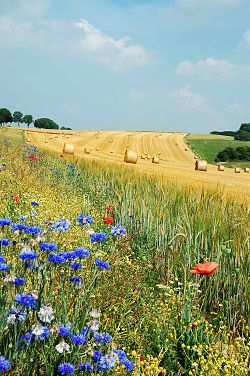
Summer
Background to the schools Wikipedia
SOS Children produced this website for schools as well as this video website about Africa. See http://www.soschildren.org/sponsor-a-child to find out about child sponsorship.
Summer is one of the four temperate seasons. Summer marks the warmest time of year with the longest days. Summer is also the longest season of any year in length (solstice to autumm equinox).
Dates
The seasons are considered by some Western countries to start at the equinoxes and solstices, based on astronomical reckoning. In North American-printed English-language calendars, based on astronomy, summer begins on June 20, the day of the summer solstice, and ends on September 20, the autumn equinox. When it is summer in the Northern Hemisphere, it is winter in the Southern Hemisphere, and vice versa.
In Ireland, summer begins on 1 May and ends 31 July, by the Irish calendar.
But, because the seasonal lag is less than 1/10th of a year (except near large bodies of water), the meteorological start of the season, which is based on average temperature patterns, precedes by about three weeks the start of the astronomical season. According to meteorology, summer is the whole months of December, January, and February in the Southern Hemisphere, and the whole months of June, July, and August in the Northern Hemisphere. This meteorological definition of summer also aligns with the commonly viewed notion of summer as the season with the longest (and warmest) days of the year, in which the daylight predominates, through varying degrees. The use of the astronomical beginning of the seasons means that spring and summer have an almost equal pattern of the length of the days, with spring lengthening from the equinox to the solstice and summer shortening from the solstice to the equinox, while meteorological summer encompasses the build-up to the longest day and decline thereafter, so that summer has many more hours of daylight than spring.
Today, the meteorological reckoning of the seasons is used in Australia, Denmark, the former USSR; it is also used by many people in the United Kingdom, but the astronomical definition is still more frequently used in the United States.
In general, seasonal changes occur later in coastal regions, so countries lying near coastlines (except Ireland) experience the start of summer later than those lying inland. Elsewhere, however, the solstices and the equinoxes are taken to mark the mid-points, not the beginnings, of the seasons. In Chinese astronomy, for example, summer starts on or around May 5, with the jiéqì ( solar term) known as Lixia (立夏), i.e. "establishment of summer", and it ends on or around August 6. An example of Western usage would be William Shakespeare's A Midsummer Night's Dream, where the play takes place over the shortest night of the year, which is the summer solstice.
In southern and southeast Asia, where the monsoon occurs, summer is more generally defined as lasting from March to May/early June, their warmest time of the year, ending with the onset of the monsoon rains.
From a popular culture point of view, in the United States summer season, is often considered to begin at the Memorial Day weekend (the last Monday in May and end at the Labor Day weekend 9the first Monday in September. Likewise, another set of pop-culural reference points for summer is the time when elementary and secondary schools close down for the "summer vacation". This period usually lasts from around June 7-10 until around August 25-30.
Effects

In most countries children are out of school during this time of year for summer holidays, although dates vary. Some begin as early as mid-May, although in England, from the ages of 5-18, school ends in the middle of July. In the Southern Hemisphere, school holiday dates include the major holidays of Christmas and New Year's Day. Summer school holidays in Australia begin a few days before Christmas and end in late January to mid-February, with the dates varying in different states.
Summer is an important season for the social agenda of individuals. Generally, the summer season in most regions of the world has an evident increase in tourism. Outdoor activity is also a hobby, taken by many people during this season, due to the favorable conditions. Leisure tasks are also associated with summer, due to the number of people on vacation.

